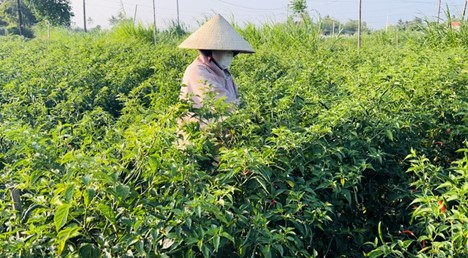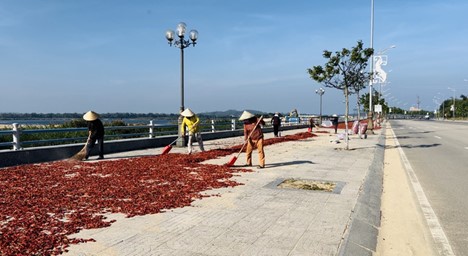Chili prices have plummeted in central Vietnam’s Quang Ngai Province following China’s suspension of Vietnamese chili shipments, according to local farmers and traders.
Nguyen Van Tri, a chili farmer from Nghia Ha Commune, Quang Ngai City, said chili prices fluctuated between VND50,000 (US$2) and VND80,000 ($3.2) per kilogram last year.
That number fell to VND12,000 ($0.5) earlier this year before dropping even further to VND10,000 ($0.4), then to VND8,000 ($0.3) per kilogram, and finally to its current floor of VND5,000 ($0.2) per kilogram as of Thursday.
Along the eight-kilometer Truong Sa Street in Quang Ngai Province, local residents have turned sidewalks into chili drying areas because they cannot sell fresh chilies.
In Nghia Dung, Nghia Ha, and Nghia Dong Communes, Quang Ngai City, chili farms span thousands of hectares, but local farmers aren’t hiring workers because they simply can’t cover the costs.
Pham Thi Nhung, a resident of Nghia Ha Commune, said she was only able to pick five kilograms of chilies in a morning, making it nearly impossible to harvest her 2,000-square-meter chili farm. Still, the low chili prices mean she can’t afford to hire help.
 |
| A farmer in Quang Ngai Province harvests chilies. Due to the low selling price, local farmers harvest chilies themselves instead of hiring employees. Photo: Tran Mai / Tuoi Tre |
According to Huong, a chili trader, chili prices are in constant flux.
“I mainly buy chilies to supply to chili sauce and dried chili businesses. Larger traders aren’t purchasing chilies anymore,” Huong said.
Chien, a trader specializing in purchasing chilies for export to China, said his Chinese partners have ceased chili imports and his refrigerated warehouses are nearly full.
If China resumes the import of Vietnamese chilies, Chien can earn big. If not, he may incur huge losses as he has to pay electricity bills and employees at his warehouses but will have no income.
Nguyen Thi Loan, vice-chairwoman of the People’s Committee of Nghia Ha Commune, said the chili price decline had put local residents in harm’s way considering they have already invested in fertilizers, seeds, and workers.
Like us on Facebook or follow us on Twitter to get the latest news about Vietnam!


















































